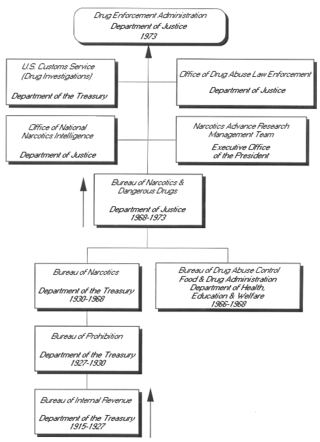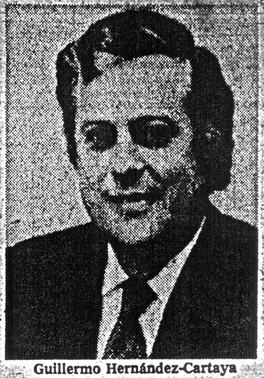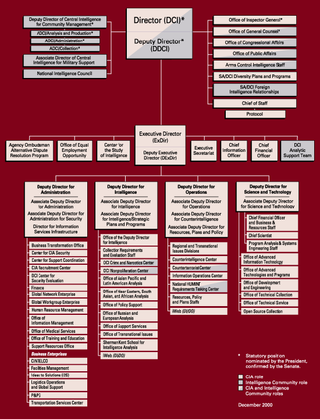Related Research Articles

The Federal Bureau of Investigation (FBI) is the domestic intelligence and security service of the United States and its principal federal law enforcement agency. Operating under the jurisdiction of the United States Department of Justice, the FBI is also a member of the U.S. Intelligence Community and reports to both the Attorney General and the Director of National Intelligence. A leading U.S. counterterrorism, counterintelligence, and criminal investigative organization, the FBI has jurisdiction over violations of more than 200 categories of federal crimes.

The Defense Intelligence Agency (DIA) is an intelligence agency and combat support agency of the United States Department of Defense, specializing in defense and military intelligence.
In the United States, a special agent is an official term used to refer to an investigator or detective for a federal or state government or independent agency, who primarily serves in criminal investigatory positions. Additionally, many federal and state special agents operate in "criminal intelligence" based roles as well. Within the U.S. federal law enforcement system, dozens of federal agencies employ federal law enforcement officers, each with different criteria pertaining to the use of the titles Special Agent and Agent. These titles are also used by many state level agencies to refer to their personnel.

The Bureau of Narcotics and Dangerous Drugs (BNDD) was a bureau within the United States Department of Justice (DOJ) and a predecessor agency of the modern Drug Enforcement Administration (DEA).

The United States National Drug Intelligence Center (NDIC), established in 1993, was a component of the U.S. Department of Justice and a member of the Intelligence Community. The General Counterdrug Intelligence Plan, implemented in February 2000, designated NDIC as the nation's principal center for strategic domestic counterdrug intelligence.

Project MINARET was a domestic espionage project operated by the National Security Agency (NSA), which, after intercepting electronic communications that contained the names of predesignated US citizens, passed them to other government law enforcement and intelligence organizations. Intercepted messages were disseminated to the FBI, CIA, Secret Service, Bureau of Narcotics and Dangerous Drugs (BNDD), and the Department of Defense. The project was a sister project to Project SHAMROCK.

World Finance Corporation was a financial corporation founded in 1971 and headquartered in Coral Gables Florida. When WFC Corp was headed and controlled by Guillermo Hernandez-Cartaya through the WFC Group shell company, it became known for a major financial scandal in which over $50 million was lost. This scandal was the subject of a 60 Minutes segment on 26 February 1978. Cartaya controlled it through a number of shell companies, the most well known of which was the WFC Group.

The Kerry Committee was a US Senate subcommittee during the 100th United States Congress that examined the problems that drug cartels and drug money laundering in South and Central America and the Caribbean posed for American law enforcement and foreign policy. The Sub-Committee was chaired at the time by Democratic Party Senator John Kerry from Massachusetts so the name of the committee and the report are often referred to under his name.

A number of writers have alleged that the United States Central Intelligence Agency (CIA) was involved in the Nicaraguan Contras' cocaine trafficking operations during the 1980s Nicaraguan civil war. These claims have led to investigations by the United States government, including hearings and reports by the United States House of Representatives, Senate, Department of Justice, and the CIA's Office of the Inspector General which ultimately concluded the allegations were unsupported. The subject remains controversial.

The Central Intelligence Agency, known informally as the Agency and historically as the Company, is a civilian foreign intelligence service of the federal government of the United States, officially tasked with gathering, processing, and analyzing national security information from around the world, primarily through the use of human intelligence (HUMINT) and conducting covert action through its Directorate of Operations. As a principal member of the United States Intelligence Community (IC), the CIA reports to the Director of National Intelligence and is primarily focused on providing intelligence for the President and Cabinet of the United States. Following the dissolution of the Office of Strategic Services (OSS) at the end of World War II, President Harry S. Truman created the Central Intelligence Group under the direction of a Director of Central Intelligence by presidential directive on January 22, 1946, and this group was transformed into the Central Intelligence Agency by implementation of the National Security Act of 1947.

Stefan A. Halper is an American foreign policy scholar and retired senior fellow at the University of Cambridge where he is a life fellow at Magdalene College. He served as a White House official in the Nixon, Ford, and Reagan administrations, and was reportedly in charge of the spying operation by the 1980 Ronald Reagan presidential campaign that became known as "Debategate". Through his decades of work for the CIA, Halper has had extensive ties to the Bush family. Through his work with Sir Richard Billing Dearlove, he had ties to the British Secret Intelligence Service, MI6.
This article deals with activities of the U.S. Central Intelligence Agency related to transnational crime, including the illicit drug trade.
This article deals with the activities of the Central Intelligence Agency (CIA) of the federal government of the United States that are violations of human rights.

The Philippine Drug Enforcement Agency is the lead anti-drug law enforcement agency, responsible for preventing, investigating and combating any dangerous drugs, controlled precursors and essential chemicals within the Philippines. The agency is tasked with the enforcement of the penal and regulatory provisions of Republic Act No. 9165, otherwise known as the Comprehensive Dangerous Drugs Act of 2002.

The federal government of the United States empowers a wide range of federal law enforcement agencies to maintain law and public order related to matters affecting the country as a whole.

The CIA publishes organizational charts of its agency. Here are a few examples.
The illegal drug trade in Panama includes trans-shipment of cocaine to the United States. The 1989 United States invasion of Panama to topple Dictator Manuel Noriega was justified in part by the need to combat drug trafficking. Noriega, the dictator of Panama from 1983 to 1989, had a relationship with the U.S. Central Intelligence Agency (CIA) from the 1950s. More recently, Mexican cartels such as the Sinaloa Cartel have been active in Panama.
Ricardo Morales Navarette, also known by the moniker "El Mono", was a Cuban exile and agent of the United States Central Intelligence Agency. He also worked for the DISIP, or Venezuelan intelligence service, and as an informant for the US Federal Bureau of Investigation, Central Intelligence Agency, and Drug Enforcement Administration.
References
- ↑ Ayres, B. Drummond Jr. (April 30, 1983). "Indicted Expert On Mideast is Found Dead in Virginia", The New York Times . Retrieved October 26, 2019 (CIA info not in ref)